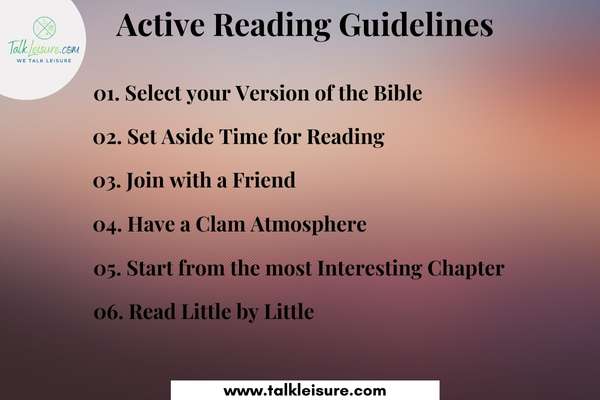The Bible is a big book, and it can be daunting to try and read it from cover to cover. But don’t worry, you don’t have to! Here are a few tips that can help make the experience more enjoyable and beneficial.
To begin with, find a translation that you will understand. There are many different translations of the Bible available, so choose one that is easy for you to read. If you are unsure which one to pick, ask your pastor or another Christian friend for help.
Pick a comfortable place where you won’t be interrupted. It’s also important to have a physical copy of the Bible rather than relying on an electronic version. This will help you focus and pay attention to the text.
Start by reading a couple of chapters from different books of the Bible. Don’t try to read it all at once! Instead, take your time and savour each section. As you read, think about what the passage is saying and how it applies to your life.
If you find yourself struggling to understand what you’re reading, there are a number of resources that can help. A study Bible can provide valuable commentary and background information. There are also many excellent Bible study apps and websites that offer guidance and insights.
The most important thing is to start reading and allow the Word of God to speak for itself. As you do, you’ll begin to develop a deeper understanding of its wisdom and power.
What is Bible, and What is written in the Bible?

The Bible is a collection of 66 books, including 39 in the Old Testament and 27 in the New Testament. It is difficult to precisely date when the Bible was written, but most scholars believe it was completed sometime around the 2nd century CE.
The Bible, especially the Old Testament, contains stories of creation, Exodus, humans trafficking other humans as slaves, Genesis-Deuteronomy, Jesus’ birth and life Matthew-John, Paul’s letters to churches, Romans-Revelation, and much more.
Its contents have been hotly debated throughout history, largely due to its religious significance. Christians generally consider the Bible to be inspired by God and expect it to be correctional and directional for their lives today.
Active Reading Guidelines

01. Select your Version of the Bible
If you’re trying to decide which version of the Bible to read, you should keep a few things in mind. First, think about why you’re reading the Bible. Are you looking for guidance or solace? Do you want to learn more about your faith? Or are you curious about what it says?
Selecting a translation becomes easier once you know what you hope to get out of reading the Bible. If accuracy is important to you, choose a version that is literal – such as the New American Standard Bible. If understanding is more important, opt for a version that is more paraphrased, like The Message.
Another factor to consider is how familiar you are with the Bible. A study Bible can be incredibly helpful if you’re new to the text. These versions provide commentary and background information that can make the reading process less daunting.
02. Set Aside Time for Reading

It is very important to set aside time for Bible reading. The Bible is the word of God, and it is essential that we read it in order to grow closer to Him. In addition, the Bible contains instructions on how to live a good life, and it is important to read it so that we can follow His guidance.
I highly recommend setting aside some time every day to read the Bible. However, if that’s not possible, try to read a chapter or two at least each week. And if you really want to dive into the Bible, try reading through it once a month. By doing this, you’ll be able to gain a deeper understanding of God’s Word and grow closer to Him.
03. Join with a Friend
Having a friend join you in active Bible reading can be a great help! First, it provides accountability and motivation to keep up with your readings. Second, it can be helpful to have someone to discuss the Bible passages with afterwards – it can help to solidify your understanding and provide new insights.
Third, having someone to pray with before and after you read the Bible can be a real blessing. Finally, simply sharing the experience of actively reading the Bible together can deepen your friendship. So yes, joining with a friend to actively read the Bible can definitely be helpful!
04. Have a Clam Atmosphere
Some people find that reading the Bible in a calm and peaceful setting helps them to focus and better understand the Scripture. Others may prefer to read the Bible in a more lively or interactive atmosphere, where they can discuss what they are reading with others. Either approach is valid as long as you are studying and applying God’s Word to your life.
05. Start from the most Interesting Chapter

It’s important to start from the most interesting chapter when Bible reading because it engages your attention and helps you stay focused. When you’re reading a book, it’s important to start at the beginning and read through to the end. The same is true when reading the Bible.
However, not everyone is interested in reading every chapter of the Bible. That’s why it’s important to start with the most interesting chapters first. This way, you’ll be more likely to read through the entire Bible.
06. Read Little by Little
It’s important to read the Bible little by little because it allows for time for reflection and for the Holy Spirit to work in our hearts. Reading through the Bible can be a daunting task, but if we take it one step at a time, we can allow the Lord to guide us and teach us what He wants us to learn.
We also need time for reflection so that we can apply what we’ve learned to our lives. And lastly, the Holy Spirit is always with us and will help us understand what we’re reading if we allow Him to do so.
07. Listen to Audio Chapters
Listening to audio chapters of the Bible can be a very useful way to engage with Scripture. It can be especially helpful if you are a visual learner or find it difficult to read for long periods. Listening to the Bible can also be a great way to wind down at the end of the day or before bedtime.
There are many different versions and translations of the Bible available in audio form, so you should be able to find one that suits your needs and preferences. Give it a try – you may find that listening to the Bible is a valuable addition to your spiritual life!
Benefits of Reading the Bible

The Bible is a book like no other. It was written by over 40 different authors over a period of 1500 years. And yet, it has one consistent message running throughout its pages – the message of God’s love for us and His plan for our salvation.
Aside from its life-changing message, the Bible also offers many benefits to those who read it regularly. Below are just some of the ways in which reading the Bible can improve your life:
1. It strengthens your relationship with God
Spending time reading the Bible is a great way to strengthen your relationship with God. As you read His Word, you will gain a deeper understanding of who He is and what He desires for your life. You will also be better able to hear His voice as you learn to recognise His guidance and direction for your life.
2. It increases your faith
Faith comes by hearing, and reading the Bible is one of the best ways to feed your faith. As you read about all that God has done throughout history, you will be inspired and encouraged to trust Him more. The more you understand His character and His promises, the easier it will be to stand firm on your faith, even in the midst of difficult circumstances.
3. It gives you wisdom and knowledge

The Bible is a treasure trove of wisdom and knowledge. As you read it, you will gain insights into many different areas of life, from relationships and parenting, to finances and work. No matter what you are facing in life, you can be sure that there is wisdom to be found in the pages of Scripture.
4. It brings comfort and hope
Reading the Bible can also bring comfort and hope in times of trouble. When you are struggling with a difficult situation, turn to God’s Word for encouragement. Read about how He has helped others in the past, and know that He will never leave you or forsake you. Lean on Him for strength, and find hope in His promises.
5. It transforms your life
Perhaps the greatest benefit of reading the Bible is that it has the power to transform your life. As you read, God will speak to your heart, and He will change you from the inside out. You will become more like Him, and His love will be evident in your life. If you have never read the Bible before, why not start today? It could be the best decision you ever make.
In summary, there are many benefits to reading the Bible, including gaining a better understanding of God and His will for our lives, developing a stronger relationship with Him, and growing in our faith. The Bible is also a great source of wisdom and guidance and can help us to overcome challenges in our lives. Additionally, reading the Bible can provide comfort and hope and can be a source of strength in times of trouble.
These are just a few of the many benefits that come from reading the Bible regularly. If you have not been doing so already, we encourage you to start today!
Few Best Places to start reading the Bible

01. Proverbs
02. Romans
03. Psalms
Visual Explanations
i. How to Start Reading? :
ii. Where to Start Reading:
Related Matters
01. Where should you start reading the Bible for beginners?
The Bible is a huge book, and it can be pretty intimidating to try to read it from start to finish. So, where should you start reading the Bible if you’re a beginner?
One good place to start is the book of John. The book of John is one of the Gospel books which tells the story of Jesus’ life. It’s a great place to learn about who Jesus was and what he taught.
Another good place to start reading the Bible is in the Old Testament book of Genesis. Genesis tells the story of how God created everything, including humans. It’s a great way to learn about God’s character and how much he loves us.
These are just a few suggestions for where to start reading the Bible. The most important thing is to start somewhere! Don’t be discouraged if you don’t understand everything you’re reading. Just keep reading, and God will help you to understand what he wants you to know.
02. What is the proper way to read the Bible?
There are a few different ways to read the Bible, and there is no one right way. Different people will find different methods of reading that work better for them.
Some people like to read straight through from Genesis to Revelation, while others prefer to read specific passages that deal with certain topics or issues. There is no wrong way to read the Bible, as long as you are honest with yourself about what you want to get out of it.
For those who want to read straight through, a good method is to set aside some time each day for reading. Try to choose a time when you can be uninterrupted and can focus on the text.
Sometimes it helps to have a physical copy of the Bible that you can highlight or make notes in as you read. You can also find many online versions of the Bible that have helpful features like study guides or commentaries.
If you want to focus on specific topics or passages, concordance can be a helpful tool. A concordance is an index of keywords that are found in the Bible.
03. What order should the Bible be read first?
There is no hard and fast rule when it comes to reading the Bible. However, there are a few general principles that can guide you in choosing an order.
The first principle is to start with the books that will give you the most basic understanding of who God is and what His plan for humanity is. For this reason, many people recommend starting with the book of Genesis.
This book gives a broad overview of God’s creation, His relationship with humanity, and His interactions with individuals throughout history.
The second principle is to read the Bible in chronological order. This means starting with the books that were written earliest in history and working your way forward. Reading in this order can help provide context for later events.
The third principle is to focus on the New Testament first. The New Testament contains the story of Jesus’ life, death, and resurrection. This is the central event of Christianity, and so it is crucial to understand.
There is no wrong order in which to read the Bible. Ultimately, the most important thing is to start reading! Pick a book or a passage and dive in. As you read, God will help you to understand what He wants you to know.
04. What are the 4 ways to read the Bible?
There are a few different ways to read the Bible. The following are four of the most common methods:
1. Literal Interpretation – this approach takes each verse at face value without looking for any deeper meaning.
2. Historical/Critical Interpretation – this approach tries to understand the biblical text in light of its historical context. It looks at who wrote the text when it was written and why it was written.
3. Literary Analysis – this approach looks at how the text is structured and how the various literary devices are used. It attempts to uncover the author’s message and purpose behind writing the text.
4. Theological Interpretation – this approach seeks to understand how each verse relates to the overall message of the Bible. It looks at how the text fits into the broader story of redemption that is being told.
No single approach is right or wrong. Different people will find different methods of interpretation that work better for them. Ultimately, the goal is to understand what God is trying to communicate through the text.
05. Is there a Bible for Dummies?
There isn’t a specifically “Bible for Dummies” book, but there are definitely plenty of resources out there to help explain the Bible to people who are new to it.
There are lots of books that serve as introductions to the Bible, including various study Bibles with accompanying commentary. These can be great ways to get started learning about what the Bible contains and what it all means.
Another helpful resource can sometimes be Bible apps or websites. There are now a number of websites and phone apps that aim to do reading and understanding the Bible easier for those who are unfamiliar with it.
These can be great also for finding specific verses or passages that you’re interested in reading more about.
Of course, another great way to learn about the Bible is to start reading it! There are many different translations of the Bible available, so there’s sure to be one that will work well for you.
Reading through the Bible can be a bit daunting at first, but there are plenty of resources available to help explain what you’re reading as you go.






